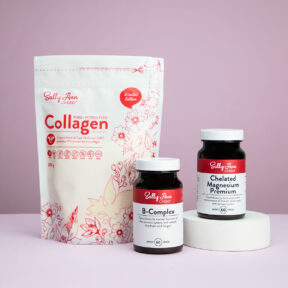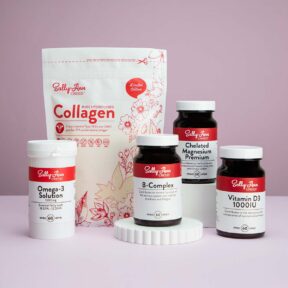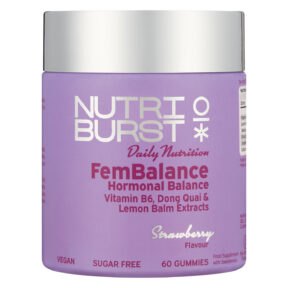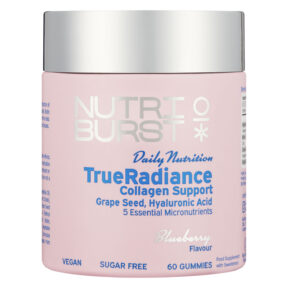
Being a woman means experiencing plenty of life-changing transitions including puberty, motherhood for some, and eventually menopause. We go through a rollercoaster of hormonal changes. And for many of us, womanhood can be a lonely journey where we don’t know where to turn for advice and feel unprepared for the changes to come.
At Sally-Ann Creed, we empathise strongly with anyone going through menopause. Many of the women in our business have gone through, or are going through, this transition at the moment, and we know how important it is to have a trusted source of information and advice at hand. That’s why we’ve put together this menopause guide. We want to share the knowledge you need to know, provide practical tips, and help you navigate this natural, yet challenging stage of life.
As you read this guide, it’s important to bear in mind that all women experience menopause differently. Our goal is to give you an overview of some of the symptoms and changes you may experience, and to share insights on how to manage them. This quote from Davina McCall speaks to our intention with this guide—to remove the stigma around menopause and provide all you need to navigate this change.
“I used to think that menopause was an age thing, and now I realise it’s a woman thing. For far too long, there’s been a shroud of embarrassment, shame and fear around this topic, and this is where it stops!”
We hope you find this guide to be a source of encouragement and support.
All our love,
The Sally-Ann Creed team
What other women have to say about menopause
What is menopause?
Menopause is a completely natural biological process that every woman will eventually experience. It’s a hormonal shift where your body transitions to a new normal, following the end of your reproductive years—in fact, the traditional definition of menopause is when you haven’t had a menstrual cycle for 12 consecutive months. But there’s more to menopause than just the absence of your period. Let’s take a closer look at the different stages and what they mean for your health and wellbeing.
Perimenopause
The beginning of the journey
Perimenopause takes place in the years leading up to menopause. It usually starts in your 40s, although some women may enter perimenopause in their 30s. During this transition stage, your oestrogen and progesterone levels begin to fluctuate, and the drop in oestrogen in particular can cause a variety of physical and emotional changes. Common symptoms in this stage may include irregular periods, very heavy bleeding, hot flushes, night sweats, disturbed sleep, weight gain, mood swings, and vaginal dryness. This stage can last anywhere from a few months to ten years, but for most women, it usually lasts about four years.
Menopause
The turning point
You have reached actual menopause when you haven’t had a menstrual period for an entire year, which usually happens in your late 40s or early 50s. At this point, your ovaries have stopped making eggs and significantly reduced their production of oestrogen and progesterone. Once you’ve reached this milestone, you enter postmenopause, which lasts for the rest of your life.
Post-menopause
Your new normal
Good news is that menopause symptoms usually start to ease in this stage, although some might linger for a while. It’s important to know that because of your significantly lower levels of oestrogen and progesterone, you’re at higher risk of health conditions like osteoporosis, cardiovascular disease, and bladder issues like urinary incontinence and urinary tract infections. In this stage, it’s more important than ever to be proactive about your health, make positive lifestyle changes, and have regular health check-ups to monitor your blood pressure, thyroid function, insulin resistance, and more.
How menopause impacts you physically
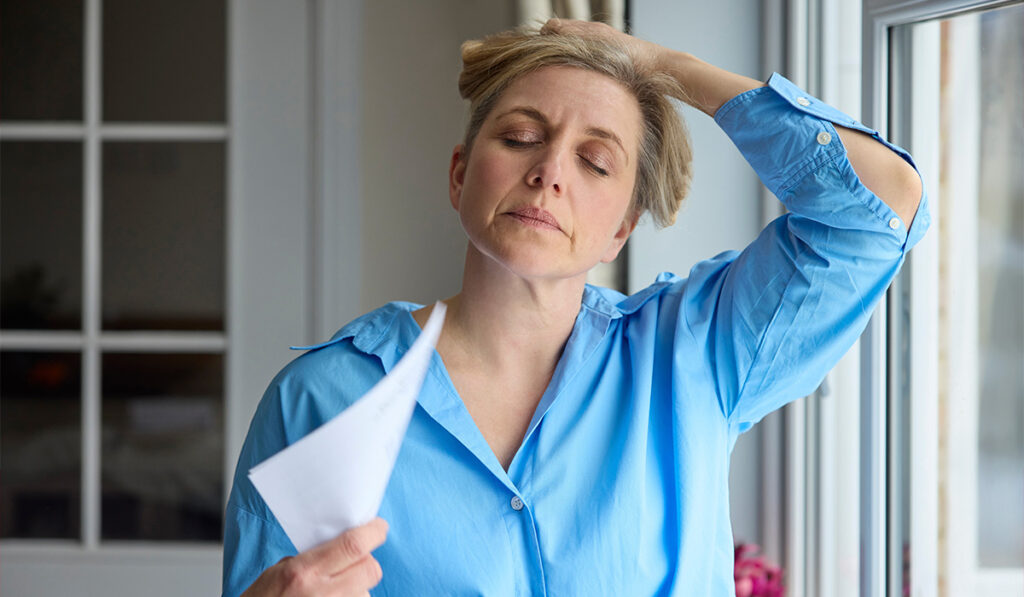
The list of possible menopause symptoms is long and ranges from fatigue and anxiety to dry eyes and heart palpitations. Here’s a brief look at some of the most frequently experienced symptoms and practical tips to help you manage them.
- Hot flushes and night sweats
- Disturbed sleep
- Dry or thinning skin
- Thinning hair
- Anxiety & depression
- Brain Fog
- Irregular periods
- Vaginal dryness
- Loss of libido
- Weight gain
- Joint pain & muscle tension
- Decreased bone density
How does menopause affect your hormones?
It’s pretty clear that menopause affects your oestrogen and progesterone, but what does it do to your other hormones and endocrine glands? Let’s take a look!
Leutinizing Hormone (LH)
Critical for your reproductive system. It’s what tells your ovaries to release an egg and make other important hormones like oestrogen and progesterone.
Follicle-stimulating hormone (FSH)
Works alongside LH in regulating the female reproductive system. FSH is crucial for the growth and maturation of ovarian follicles. Like LH, the levels of FSH change during different phases of a woman’s life.
Insulin
Insulin helps regulate your blood sugar levels by enabling glucose uptake into cells for energy.
Cortisol
Known as the ‘stress hormone’, cortisol helps regulate various functions, including metabolism and immune response. It also helps you manage stress.
Leptin
This hormone is mainly produced by your fat cells and helps to regulate your energy balance. When your leptin levels are high, your brain gets the message that you have enough fat stored, and this reduces hunger and helps you to maintain a healthy weight. Leptin is usually highest in the evening and early morning hours, so your body can repair itself without getting hungry.
Thyroid Gland
This powerhouse produces hormones that are pivotal in regulating your metabolic rate, growth, and development. It exerts control over critical functions like heart regulation, muscle control, digestion, brain maturation, and the maintenance of strong bones. The thyroid gland relies on a sufficient supply of iodine from your diet to function at its best.
Adrenal glands
Your adrenal glands play a vital role in your body’s response to stress and help regulate several essential bodily functions. They produce hormones like adrenaline, cortisol, and aldosterone, and help you cope with stress, maintain energy levels, and keep your bodily functions in check.
Some practical tips for dealing with menopause
There’s no doubt that menopause can be tough, challenging and frustrating, but it can also be an opportunity to take charge of your health and wellbeing. Here are three practical tips to help you thrive – in menopause and beyond.
Be mindful of what you eat
It’s an oldie but a goodie—you are what you eat. So focus on having nutrient-rich whole foods at each meal and aim to eat low-carb (not no-carb) to help control your insulin levels. Also avoid processed foods, sugar, coffee, fizzy drinks, very spicy foods, and alcohol, which can all place extra stress on your adrenal glands. What should you include in your diet? Opt for pasture-raised meat and other good-quality proteins, free-range organic eggs, healthy fats, and organic veggies. Be mindful of fasting or intermittent fasting during this period as it may not be beneficial for all.
Incorporate more Phytoestrogens
Phytoestrogens are compounds found in plants that have the potential to “mimic” the effects of oestrogen in the body. Interestingly, they might also help balance oestrogen by providing an anti-oestrogenic response, blocking the more potent effects of oestrogen, when levels are high. There are two main groups: lignans and isoflavones. Phytoestrogens work by binding to oestrogen receptors in the body, potentially exerting oestrogen-like effects. The 2015 menopause guidelines from NICE showed that phytoestrogens can reduce symptoms of menopause such as hot flushes. Sources that include phytoestrogens are soya (tofu, tempeh, miso, natto, edamame beans), chickpeas, lentils, peas, ground linseed/flaxseed, sesame seeds, cashews etc.
Stay at a healthy weight
Heard of the term “middle-age spread”? Unfortunately it’s a reality for many women in menopause because of hormone changes and also because we become less sensitive to insulin as we get older. One of the key things you want to do is focus on your adrenal health so that you have plenty of energy during the day and lower levels of cortisol at night to give you restful sleep. In addition to the healthy eating suggestions outlined previously, here are a few tips to help you support your adrenal glands and avoid menopause-related kilo creep.

